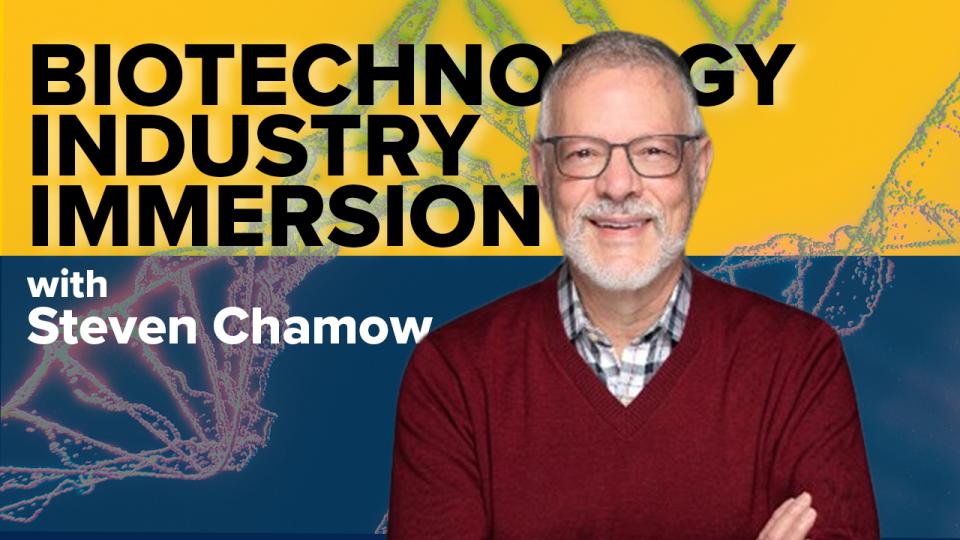Biotechnology Industry Immersion Partners with Industry Leaders to Form Advisory Board
Meet UC Davis alumnus Steven Chamow, Advisory Board Chair

The Graduate School of Management offers unique interdisciplinary Industry Immersions experiences where MBAs team up with other UC Davis graduate students to solve real business problems presented by top industry executives.
These Immersion are in three high-growth areas that are solving some of the world’s biggest challenges: Food and Agriculture, Sustainable Energy and Biotechnology.
To stay on the cutting-edge, we’ve brought together top experts who volunteer to serve on advisory boards for each Immersion.
Most recently, we hosted our Biotechnology Advisory Board here at the Graduate School of Management. They graciously met with our MBA students to offer mentorship, internship opportunities and career advice.
The Biotechnology Industry Immersion board is chaired by UC Davis alumnus Steven Chamow, the senior vice president of chemistry, manufacturing, and controls development at Alira Health. Alira is one of the top 10 in Forbes' World's Best Management Consulting Firms in Life Sciences and Pharma.
Chamow is a dedicated Aggie. He earned his Ph.D. in biochemistry from UC Davis and is an experienced biotechnology executive and consultant with more than 35 years of biopharmaceutical experience.
Led by Chamow, the advisory board that includes top biotech executives, venture capitalists, groundbreaking researchers and principal consultants.
We thank them for connecting with our students and offering continuous insights to the dynamic forces propelling the biotech industry forward.
Advisory Board
| Member | Affiliation | Title |
|---|---|---|
| Steven Chamow | Alira Health LLC | Principal Consultant Advisory Board Chair |
| David Dodds | Dodds and Associates | Consultant |
| Cory Berkland | Washington University | Professor and Entrepreneur |
|
Travis Englemann |
Danaher | VP Business Development |
| Russ Lehrman | Alira Health LLC | Consultant and Entrepreneur |
| Niall O'Donnell | Rivervest Ventures | Venture Capitalist |
| John Selep | Agtech Innovation Alliance | Co-founder and Chairman |
| Sunita Dhar | Genentech | Executive Medical Group Director |
| Fernando Beils | Qiagen | Sr. VP, Molecular Diagnostics |
| Christian Borjesson | Beckman Coulter (Danaher) | President, Microbiology |
| Mimi Villanueva | Biora Therapeutics | Vice President PD Operations and Project Management |
Video Transcript
Steven Chamow
I think that biotechnology is going to be one of the most exciting industries of the 21st century. The advances that we're going to see are going to be transformative for human health. I have 40 years in the biotechnology industry.
My background is in biologics manufacturing. I'm a protein chemist by training and have been designing and scaling manufacturing processes for clinical and commercial products. A request was made by the dean to establish an advisory council for the Biotechnology Immersion program. I thought it was a good opportunity. I'm interested in in contributing to UC Davis in a meaningful way, and that's why I decided to do this.
Biotechnology is a highly technical industry. It's not engineering. It is based in biology. It's based on life science. I think it's important for the leaders of this industry to understand the technical basis for the products and how they work. That linkage and communication is critically important. it's important for a program like UC Davis to understand the importance of that linkage.
We're not training Ph.D.’s here in this program, but these folks do need to understand that they will be leading technical experts, coordinating the activities of technical experts, and in order to get the most out of the work that those technical experts do, they need to understand as much as they can.
The other important aspect that UC Davis students in biotechnology need to understand is, and this is true with any powerful technology in society, is that it can be used for tremendous good, but that it also can be abused. We take something like gene editing technology, that's CRISPR, which has tremendous potential for human health.
Should the technology be used in this way?
Is that ethical?
Is that morally justified?
Cell and gene therapy, I think, has a tremendous future. There's so many ways that this industry is going to impact our lives.
For students who are interested in a meaningful career where they can contribute to a society in such an important way, this is a great opportunity.

